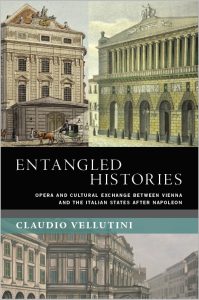Author: Claudio Vellutini
Publication details: Oxford University Press
Weblink: doi.org/10.1093/9780197656594.001.0001
Abstract:
Entangled Histories discusses the role of opera in the patterns of cultural exchange across the Austrian Empire in the decades following the wars against revolutionary and Napoleonic France. It argues that new modes of opera production and dissemination between Vienna and the Italian states contributed to official cultural policies promoting a supranational identity of the Austrian Empire—one that acknowledged, but ultimately transcended cultural differences. As the state emerged victoriously yet completely transformed from over two decades of wars, opera—with its long tradition of impresarios, composers, librettists, and performers on the move—became a key tool for bringing some of the different cultural traditions of the empire (particularly the Italian and German ones) into a mutually fruitful dialogue. Through a wealth of archival documents and printed materials, this book shows that, during the first half of the nineteenth century, opera helped redefine questions of collective identity in the Austrian Empire, serving as a testing ground for theories of language and education, notions of fatherland and citizenship, artistic expressions of cultural hybridity, new forms of managing economic and cultural capital, and practices of collective memory. By emphasizing the entanglements between opera’s aesthetics, its social function, and the ideology underpinning its system of production in different institutional and urban contexts, Entangled Histories places opera at the intersection of a broad set of political and cultural relationships that for several decades connected Vienna and prominent Italian operatic centers, thus contributing to a transnational historiography of the art form in the nineteenth century.
